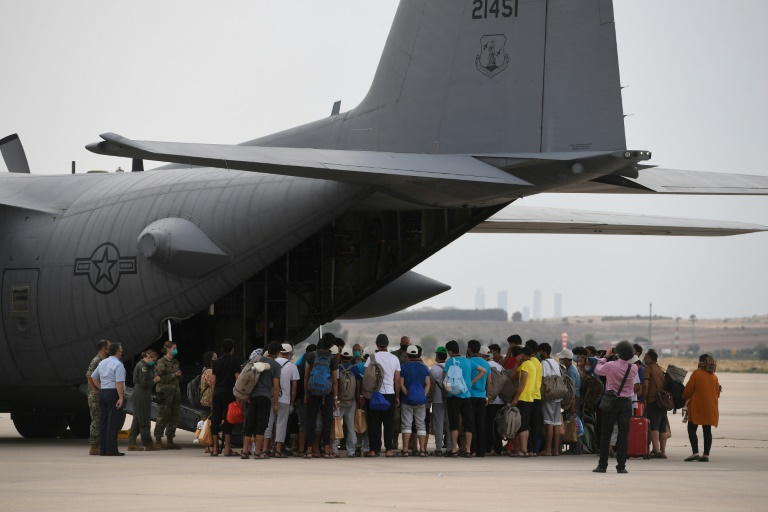Afghans on Wednesday faced an increasingly desperate race to escape life under the Taliban after President Joe Biden confirmed US-led evacuations will end next week.
More than 80,000 people have been evacuated since August 14, but huge crowds remain outside Kabul airport hoping to flee the threat of reprisals and repression in Taliban-ruled Afghanistan.
Biden said Tuesday the United States would stick to his August 31 deadline to completely withdraw its troops despite warnings from European allies that not all vulnerable Afghans would be able to leave by then.
“The sooner we can finish, the better… each day of operations brings added risk to our troops,” Biden said Tuesday.
“We are currently on the pace to finish by August 31.”
Washington and its allies have been flying out thousands of such Afghans every day on hulking military transports, but it has become an increasingly difficult and desperate task.
Many Afghans fear a repeat of the brutal five-year Taliban regime that was toppled in 2001, and violent retribution for working with foreign militaries, Western missions and the previous US-backed government.
There are particular concerns for women, who were largely banned from education and employment and could only leave the house with a male chaperone during the group’s rule in the 1990s.
On Wednesday, German Chancellor Angela Merkel said the international community must maintain dialogue with the Taliban if it is to protect any progress made over the past 20 years.
“Our goal must be to preserve as much as possible what we have achieved,” she said.
– Growing risk –
The Afghan capital’s airport has been gripped by chaos as US-led troops try to maintain a secure perimeter for evacuation flights, surrounded by desperate Afghans.
Some have foreign passports, visas, or eligibility to travel, but most do not. At least eight people have died in the chaos.
“Does anyone … ANYONE … have a contact inside the airport,” pleaded one American on a WhatsApp group set up to share information on how people can access the airport.
“My guy worked for us 2010-15 and needs to get out with 5 of his family. This is real bad.”
The Taliban have also been accused of blocking or slowing access for many trying to reach the airport, although they denied the charge again late Tuesday.
Biden said the Taliban were taking steps to assist, but there was also an “acute and growing risk” of an attack by the regional chapter of the Islamic State jihadist group.
CIA Director William Burns flew to Kabul for a secret meeting with top Taliban leader Abdul Ghani Baradar, US media reported Tuesday, the highest-level meeting so far between the US government and the new rulers of Afghanistan.
The New York Times said he was there for general talks on “evacuation operations and terrorist threats”.
– ‘It will not be enough’ –
Despite the harrowing scenes at Kabul airport, the Taliban have ruled out any extension to next Tuesday’s deadline to pull out foreign troops, describing it as “a red line”.
“They have planes, they have the airport, they should get their citizens and contractors out of here,” Taliban spokesman Zabihullah Mujahid said Tuesday.
European nations have said they would not be able to airlift all at-risk Afghans before August 31.
“Even if (the evacuation) goes on… a few days longer, it will not be enough,” German Foreign Minister Heiko Maas told Bild TV.
A hard withdrawal deadline presents a further complication that may reduce the number of daily evacuations.
The United States deployed fresh troops for evacuations.
That 6,000-plus contingent, as well as hundreds of US officials, 600 Afghan troops and the equipment, will have to be flown out.
To do that by August 31, the Pentagon said operations would have to start winding down days in advance.
– Taliban urge Afghans to stay –
Following their lightning victory that stunned the world, the Taliban have so far been content to allow the US-led operation to continue, focusing instead on consolidating control and forming a government.
They have vowed a different, more inclusive regime this time around, offering amnesty to opponents.
An aid worker in Khost, a deeply conservative region in the southeast that fell to the Taliban shortly before they seized Kabul, told AFP the attitude of the former insurgents has so far been “much softer” than people expected.
“But the people are afraid of a bad economic situation,” he added.
Many Afghans, however, remain fearful and sceptical.
The Taliban spokesman on Tuesday urged skilled Afghans to not flee, saying the country needed “expert” Afghans such as doctors and engineers.
But Zabihullah Mujahid added that women who work for the Afghan government should stay home until the security situation improves.
The movement has offered vague rights to women, who will be able to get an education and work, but within what they consider Islamic bounds.










